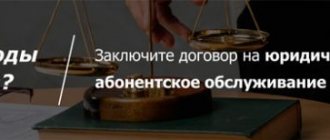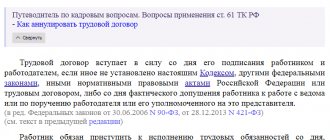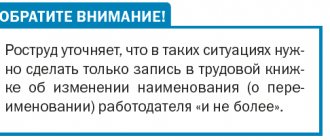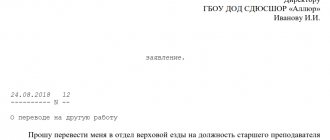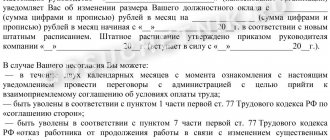Termination of an employment contract for submitting false documents
Rules for using services and information
users of the electronic services system “Onlineinspection.rf”
The rules for the use of services and information by users (hereinafter referred to as the Rules) of the system of electronic services “Onlineinspektsiya.rf” (hereinafter referred to as the System) apply to all electronic services of the System, without exception, accessed through sections and pages of the Internet portal https://onlineinspektsiya. RF (hereinafter referred to as the Portal). These Rules govern the behavior of all, without exception, registered users in the System and unregistered visitors to the Portal.
1. Terms and concepts used in these Rules
1.1 These Rules use the following terms and concepts:
System – system of electronic services “Onlineinspektsiya.rf”.
Services are basic and additional tools offered to the User for interaction with authorities.
The portal is an information resource created for the purpose of interaction of citizens with the System, located on the Internet at the address: https://onlineinspektsiya.rf.
The portal administration is officials of the Federal Service for Labor and Employment and representatives of the contractor under the state contract for the provision of technical support of the Portal, who carry out the operational management of the Portal.
User – a person registered on the Portal who is invited to use the services provided by the Portal.
Moderator is a representative of the portal Administration who processes user messages.
Moderation is the process of processing and analyzing the compliance of the User’s message with the provisions of these Rules for the use of services and information by users of the online services system “Onlineinspektsiya.rf” and the User Agreement.
2. General rules
2.1. To access the publication of messages on the Portal (discussions, comments, questions and use of any other means of interaction between the User and the System), each Portal User must read and agree with these Rules.
2.2. After reading the texts of the Rules of Use and the User Agreement, confirming agreement with them on the registration page or sending a message, each User, by these actions, enters into an agreement with the Portal Administration to regulate their relationship.
2.3. The Portal Administration has the right to carry out moderation through representatives of the Portal Administration - moderators.
2.4. These Rules may be amended by amending the relevant order of the Federal Service for Labor and Employment.
3. User registration
3.1. The Portal has a user registration system. Only registered users have the opportunity to interact interactively with the System services.
3.2. To register on the Portal, the User specifies a valid email address - notifications about the current status of published messages (appeals) will be sent to it, and selects a conditional User name (“nickname”).
3.3. When registering a User, the System requests a password for the login being registered. This password must be known only to the User and must not be disclosed to third parties. The password used can be changed by the User in a special section of the Portal – User Profile.
3.4. When registering a User, the System initiates the authorization process by sending an SMS message with an activation code to the User’s phone number specified during registration. The received password must be entered in a special field in the window that opens. Only after entering the password will the account be activated.
3.5. For users who have an account on the Public Services Portal (https://www.gosuslugi.ru/), the opportunity to authorize using the login and password for this account is provided. If registration is carried out using this method, verification via SMS message is excluded.
4. Publication of appeals
4.1. Each registered User can publish an appeal.
4.2. Appeals are published in accordance with the proposed classifier of problem categories.
4.3. To create a request, you must fill out the request form. In the application form, the User must indicate his real data.
4.4. The user must fill in the following fields about himself as an applicant:
— the applicant’s residential address;
— last name, first name, patronymic (if any) of the applicant;
— the applicant’s mobile phone number (if there is no mobile phone required when registering in the System, the applicant has the right to submit an application directly to the email address of the territorial body of Rostrud. The list of territorial bodies of Rostrud is posted on the unified information portal of the Federal Service for Labor and Employment on the Internet "(https://rostrud.ru/). If the User has not previously registered on the Portal, an activation code will be sent to this specified phone number, which must be entered in a special field in the window that appears in order to activate the User’s account and contact him ;
— email address to which notifications about the progress of solving the problem will be sent.
The Portal Administration ensures non-disclosure to third parties of all user data entered during the registration process, except for cases stipulated by the User Agreement.
4.5. The user must fill in the following fields about the place of work:
- region, city and exact actual address of the organization of which he is an employee;
— information about the organization: name, legal form, legal address, information about the director;
— information about your position and period of work;
— information about third parties whose mention is required to fully describe the problem.
4.6. The user needs to fill in the following fields about his problem:
— explanations of the current situation;
— photographic materials.
Information entered in the “Explanation of the current situation” field becomes public and should be of a general nature. In this field it is prohibited to mention the personal data of third parties. If the applicant violates this paragraph of the rules, the User himself is responsible for the publication of information.
Photographic materials are classified information by default and can be published publicly at the discretion of the User.
4.7. Before sending the application, the User agrees with these Rules for the use of services and information by System users and accepts the agreement on the processing of personal data. In case of disagreement with these conditions, each User has the right to refuse to use the resource and use other types of communication offered on the official resources of the department.
4.8. The Portal uses post-moderation of messages. Messages are published immediately after they are posted by users and, if they violate these Rules, they are deleted, or the moderator sends a letter to the User with a request to eliminate the violation.
4.9. Reasons for refusal to publish a message or proposal to make adjustments:
- ignoring spelling rules and profanity, the message is not written in the state language of the Russian Federation or contains a large number of spelling and syntax errors, is written in capital letters, contains profanity, including in a veiled form;
- the lack of a logical connection between the sentences in the address, which does not allow one to understand the general meaning of the described case;
— extremism, discrimination (in all forms: racial, ethnic, age, gender, religious, social, etc.);
- commercial purposes and advertising - if, in the opinion of the moderator, the published information is directly or indirectly aimed at making a profit;
- insufficient description or unfounded accusations - the moderator reserves the right to reject a case if the information specified in it does not allow us to draw a conclusion about an existing offense;
— cases in which there is no specific indication of the problem and there are questions of a rhetorical nature are not moderated;
— cases that do not correspond to the category chosen by the User are not moderated;
— messages that duplicate previously published messages are not moderated (the text of the message completely repeats the text of the previous message, that is, it does not contain new information).
4.10. The user can familiarize himself with the response to the published appeal in his personal account, having previously completed authorization on the Portal.
Thank you for your attention and understanding!
The plenum of the Supreme Court will explain the specifics of criminal liability for forgery of documents
On November 19, the Plenum of the RF Armed Forces sent for revision a draft resolution “On some issues of judicial practice in cases of crimes provided for in Articles 324–327.1 of the Criminal Code of the Russian Federation.”
The following compounds relate to crimes against the order of management:
Art. 324 of the Criminal Code establishes liability for the illegal acquisition and sale of official documents and state awards;
Art. 325 – for theft and damage to documents, stamps, seals and theft of excise stamps, special stamps and marks of conformity;
Art. 325.1 – for unlawful taking of the state registration plate of a vehicle;
Art. 326 – for falsification and destruction of vehicle identification number;
Art. 327 – for forgery, production and circulation of counterfeit documents, state awards, stamps, seals and forms;
Art. 327.1 – for the production, sale and use of counterfeit excise stamps, special stamps and marks of conformity.
The Plenum will give the concept of an “official document”
Falsification of evidence in civil proceedings: concept
Falsification of evidence in court is a criminal offense for which liability is provided. During the process, the parties present to the court evidence of their innocence, and the future verdict largely depends on their persuasiveness. Evidence refers to facts, information, material things and other evidence.
To increase the chances of a positive judicial decision, some citizens resort to falsifying evidence, that is, providing deliberately false, unreliable information.
But they should not forget that if the fact of falsification is revealed:
- faces criminal liability;
- the court verdict will be reviewed.
Falsification of evidence refers to the deliberate misrepresentation of facts in order to influence the outcome of a civil trial. This act has objective and subjective sides. The objective side consists of making changes to real evidence, which makes it unreliable or false.
Most often in practice we encounter the following types of offenses:
- forgery of signatures;
- distortion or additional printing of official documentation (correction of dates, signatures, etc.);
- changing the composition of the documentation (i.e. entering into it false information that distorts information);
- forgery of documents, etc.
When falsifying, a mandatory attribute is the presence of intent on the part of the criminal. Those. he must resort to misrepresentation intentionally with a personal interest in such action and be aware of the legal consequences of his actions. This is the subjective side of the crime.
If a person accidentally made a mistake in a document, then there is no talk of an offense; there will be no crime in this case.
Providing a false expert opinion to the court or incorrectly translating an official document from a foreign language also does not constitute falsification, even if these actions resulted in an unlawful judicial decision.
The moment of commission of the crime will be the date of provision of false information to the court. After which the crime will be considered committed.
The fact of falsification of evidence can be detected as follows:
- by comparing data from different sources;
- comparison of data from the certificate with information from the database archive;
- conducting a survey of persons who were responsible for submitting documents;
- comparison of signature samples;
- conducting an examination.
Not only the person who provided false evidence, but also other persons involved in the preparation of documents may be held liable. For example, a doctor who issued a falsified certificate will be held accountable as an accomplice.
Responsibility is provided not only for the participant in the process, but also for his representative in civil proceedings. In this case, the court will take into account whether there was a preliminary conspiracy between these persons.
Legal regulation and responsibility
Punishment for falsifying evidence in a trial is provided for in accordance with Article 303 of the Criminal Code, namely part one. Parts 2-4 of this article prescribe punishment for falsification of information in criminal trials, which are punished more harshly.
A similar article appeared in the Criminal Code of the Russian Federation in 1996.
If the guilt of the person who committed the falsification is proven, he will face a fine, compulsory or correctional labor, or arrest.
Part 1 of Article 303 of the Criminal Code of the Russian Federation provides for the following punishment:
- fine in the amount of 100-300 thousand rubles. or in the amount of salary or other income of the convicted person for a period of 1 to 2 years;
- compulsory work for up to 480 hours;
- correctional labor for up to 2 years;
- arrest for up to 4 months.
Considering that punishment in civil cases is usually milder, falsifying evidence in this case makes no sense.

